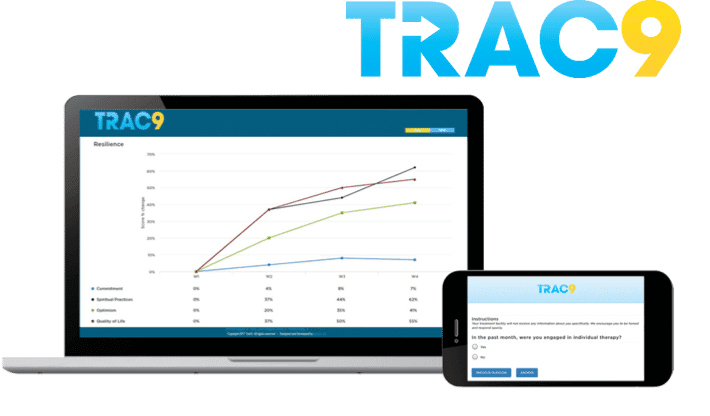Trac9
Enhancing Outcomes with Data
Automated assessments and follow-ups
A major issue with addiction treatment is what happens after guests leave rehab. Treatment at our facility in Mesa, Arizona, is only the first step in a lifelong journey. So, when you leave rehab, what happens next?
That’s where Trac9 comes in…

Through a secure web app, Trac9 uses a series of standardized assessments to identify changes in things like:
- Depression
- Anxiety
- Stress
- Visual response to cravings
- Verbal response to cravings
- Spirituality
- Commitment to sobriety
- Optimism
- Quality of life

How Does Trac9 Help With Continued Recovery?
Trac9 assessments are collected as needed (typically weekly) to track the user’s responses. These responses predict the likelihood of a relapse. The results are charted in an easy-to-read graph that shows the client’s progress and/or the need for additional recovery work. When responses seem to predict relapse, the client’s clinician will be automatically notified if a follow-up is needed.
Trac9 creates a better way for facilities to stay in touch with their clients long after discharge. This ongoing relationship creates accountability for both the client and the treatment center. By measuring the success of their clients or the need for additional care, facilities can develop best practice tools that lead to measurable, positive outcomes.
Trac9 Highlights
- Real-time monitoring of the client’s progress
- Instant alerts are sent to the treatment team if the client’s symptoms increase
- The facility’s clinical director monitors the quality of care for all clients
- Monitoring of clients’ satisfaction with treatment
- Monitoring of symptoms and protective factors that promote recovery
- 12 monthly follow-ups after the client discharges from treatment
- Real-time monitoring for each of our locations
- Computer analysis that allows for the identification of high-risk patients
Trac9 Developers
Dr. Kitty Harris Wilkes serves as President of NLW Partners, which is dedicated to consulting, education, science, and research for addiction recovery. She is a noted author and public speaker, and presents at national conferences, workshops, and seminars on topics including adolescence; collegiate addiction and recovery; and communication, civility, and leadership. She served for twelve years as the Director of the Center for the Study of Addiction and Recovery (CSAR) at Texas Tech University. Under her leadership, the CSAR gained national attention, appearing in the Wall Street Journal, on the NBC Today Show, and on CNN, and being featured in The Chronicle of Higher Education, Inside Higher Ed, and The New York Times. Dr. Harris is the author of Women and Recovery-Finding Hope, published by John Wiley & Sons, Inc. and co-editor of Substance Abuse Recovery in College, published by Springer.
Jared P. Dempsey, Ph.D., serves as Chief Scientist at NLW Partners. Dr. Dempsey is actively involved in neurological and physiological research in addiction. Recent publications include preliminary evidence for a biological marker of addiction recovery, non-conscious emotional response to drug stimuli, and the influence of social anxiety on addiction treatment. Dr. Dempsey has also served as an expert reviewer for the Journal of Motivation and Emotion, Psychopharmacology, Journal of Psychopathology and Behavioral Assessment, American Journal on Addictions, Addiction, Psychiatry Research, European Psychiatry, Nicotine and Tobacco Research, and the Journal of Studies on Alcohol and Drugs. Dr. Dempsey was also actively involved in the development of a comprehensive symptom tracking and outcome data collection tool for addiction treatment, Trac9.